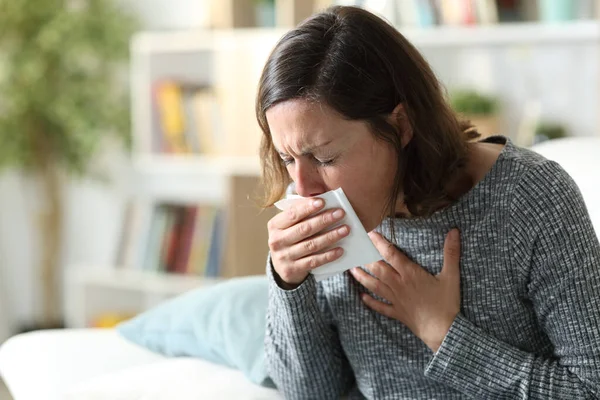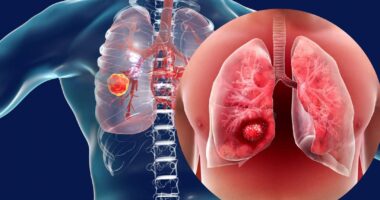Is Your Cough a Sign of Pneumonia? Pneumonia is a serious lung infection that can cause significant health issues if left untreated. Understanding its symptoms, causes, and treatment options is crucial for early detection and effective management. This guide will provide you with essential information about pneumonia, including how it develops, how it spreads, the symptoms to watch for, how it is diagnosed, its potential dangers, and treatment options.

What is Pneumonia and How Does it Develop?
Pneumonia is defined as an infection that inflames the air sacs in one or both lungs. These air sacs may fill with fluid or pus, leading to cough with phlegm or pus, fever, chills, and difficulty breathing. Pneumonia can be caused by various pathogens, including bacteria, viruses, and fungi. The most common types include:
- Bacterial pneumonia: Often caused by Streptococcus pneumoniae, this type can develop on its own or after a cold or flu.
- Viral pneumonia: Typically caused by viruses such as influenza or the respiratory syncytial virus (RSV). It often follows a viral upper respiratory infection.
- Fungal pneumonia: More prevalent in individuals with weakened immune systems and can result from exposure to certain fungi in the environment.
The development of pneumonia usually begins when pathogens enter the lungs, often following an upper respiratory infection. The body’s immune response to these pathogens leads to inflammation in the lungs, which can severely impair breathing.
How Pneumonia is Spread
Pneumonia can spread through respiratory droplets when an infected person coughs or sneezes. It can also be contracted by touching surfaces contaminated with these pathogens and then touching the face. Factors that increase the risk of spreading pneumonia include:
- Close contact with infected individuals
- Crowded living conditions
- Weakened immune systems
- Smoking
Understanding these transmission methods is vital for prevention, especially in high-risk environments such as nursing homes or hospitals.
Symptoms of Pneumonia in Adults: What to Watch For
Recognizing the symptoms of pneumonia early can lead to prompt treatment and better outcomes. Common symptoms include:
- Persistent cough that may produce greenish or yellow mucus
- Chest pain that worsens with breathing or coughing
- High fever (38°C or higher)
- Shortness of breath or difficulty breathing
- Fatigue and weakness
- Loss of appetite
If you experience these symptoms, especially if they worsen over time or are accompanied by confusion or bluish skin around the lips or fingertips, it is crucial to seek medical attention immediately.
How Pneumonia is Diagnosed
Diagnosing pneumonia typically involves a combination of a medical history review, physical examination, and diagnostic tests. Healthcare providers may conduct:
- Physical exams: Listening to lung sounds with a stethoscope to detect abnormal sounds.
- Chest X-rays: To visualize areas of inflammation in the lungs.
- Blood tests: To check for infection and determine its severity.
- Sputum tests: Analyzing mucus samples to identify the causative organism.
Accurate diagnosis is essential for determining the appropriate treatment plan.
Is Pneumonia Dangerous?
Pneumonia can be life-threatening, particularly for certain high-risk groups such as infants, elderly individuals over 65 years old, and those with underlying health conditions like diabetes or heart disease. Potential complications include:
- Acute respiratory distress syndrome (ARDS): A severe form of respiratory failure.
- Sepsis: A life-threatening response to infection that can lead to organ failure.
- Lung abscesses: Pockets of pus that may require surgical intervention.
Understanding these risks underscores the importance of timely medical intervention.
How to Treat Pneumonia
Treatment for pneumonia varies based on its cause (bacterial, viral, or fungal) and severity. Common treatment options include:
- Antibiotics: Essential for treating bacterial pneumonia; they may be administered orally or intravenously depending on severity.
- Antiviral medications: Used for viral pneumonia; however, many cases resolve without specific antiviral treatment.
- Supportive care: Includes rest, hydration, over-the-counter medications for fever and pain relief.
In severe cases, hospitalization may be necessary for oxygen therapy and more intensive monitoring. Recovery from pneumonia can take time; some individuals may feel fatigued for weeks even after treatment.

Conclusion
Awareness of pneumonia’s symptoms and risk factors is crucial for early detection and effective treatment. If you experience persistent coughs accompanied by other symptoms like fever and difficulty breathing, do not hesitate to consult a healthcare professional. Timely intervention can significantly improve outcomes and prevent complications associated with this serious lung infection.
Don’t Miss | 5 Things to Know About Mycoplasma Pneumoniae – Fast Facts










